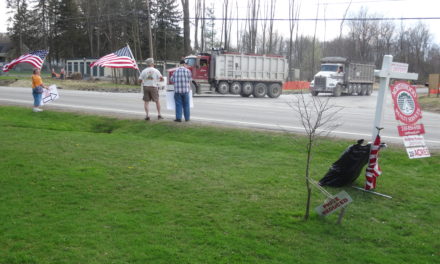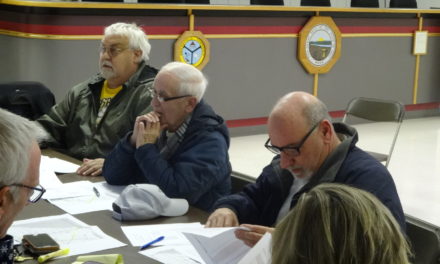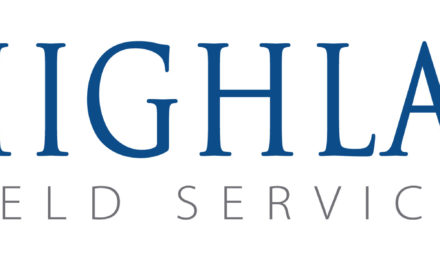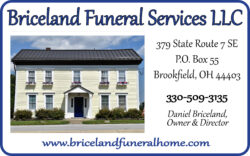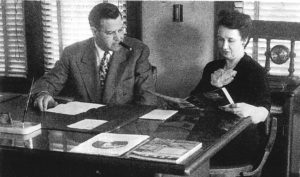
Sam and Gladys Jennings are shown in their shared work space at Jennings Manufacturing Co. in Masury.
When Samuel Jennings died in 1974, his obituary called him “Masury’s No. 1 booster.”
Since then, the memory of Jennings and what he did to earn that title have faded. A pocket park that was recently opened in Masury in honor of Jennings and his wife, Gladys, should help carry on the name for future generations.
Jennings was a “self-made man,” according to his grandson, Tim Taylor, who donated the land on which the park was built, at First and Mulberry, to the township. Newspaper stories on Jennings collected by Taylor use similar terms to describe Jennings, who built an industrial powerhouse in Masury.
But, for all Jenning’s accomplishments, his wife shares at least as much credit for their success. A 1948
story published by the Youngstown Vindicator and reprinted by the Kenton Daily Democrat quoted an
unnamed competitor who said that Jennings consulted with his wife “on practically every major
question.”
A 1958 Vindicator story described Jennings as a man who “lives, breathes and eats” business, and called
him “a restless man of great ambition” who chewed on 16 cigars a day to ease the tension.
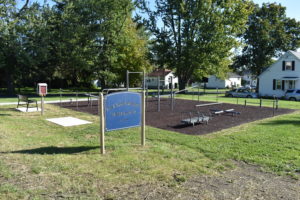
Jennings Memorial Park
Taylor similarly remembered his grandfather as “A guy that was always working.”
Jennings was born Nov. 6, 1903, in Washington, Pa., to Samuel and Hester Jennings, but the family
moved to Locust Street in Masury when he was a baby.
The elder Jennings worked as a foreman for Petroleum Iron Works, which later became part of the GATX
plant in Masury, and the son started work there at age 11, sorting rivets.
Jennings lost his job during the Great Depression, and used his savings to set up a shop in his garage in
1930. He made and sold to the Vindicator home newspaper delivery tubes. He approached the Isaly Co.,
which had a store in Masury, with an idea for making metal ice cream spoons, and soon was supplying
them with spoons, trays, ice cream cabinets and other items.
The business grew as Jennings spent time on the road selling his products, and he built the two
manufacturing facilities that now are owned by Eddie Kane Steel. Jennings Manufacturing Co. eventually
made large items for steel and rubber manufacturing and other heavy industries.
During World War II, Jennings Manufacturing made parts for military landing boats.
Mrs. Jennings was born Gladys Cowdery in Niles, and planned to be a teacher before meeting her
husband. They married in 1922. She worked for the business as vice president and secretary, sharing her
husband’s office space.
 Jennings built a home on Locust, across the street from his father’s. He and Gladys had four daughters, including Taylor’s mother, Beverly, who married Kenneth Taylor.
Jennings built a home on Locust, across the street from his father’s. He and Gladys had four daughters, including Taylor’s mother, Beverly, who married Kenneth Taylor.
Taylor recalled that his grandfather didn’t like to be away from the office for long. On a typical day,
Jennings would go to work early, come home for supper, and often go back to work.
“I don’t have time for anything except my work,” Jennings told the Vindicator. “It’s the most romantic
thing a man ever did.”
Taylor worked for his grandparents from 1973-80, doing labor, sweeping, operating an overhead crane,
working in the layout department and making patterns. On days when Taylor worked midnights, it wasn’t
unusual for his grandfather to come in to the plant in the wee hours of the morning to deal with some
issue that had arisen, Taylor said.
Jennings’ concern for his workers led to him build houses that were rented at low cost, primarily on
Locust, Chestnut and Oak streets. Taylor has original photographs of some of the homes just after they
had been built, some with explanations handwritten by his grandfather.
“My grandfather built quite a few houses in Masury for the workers.”
Jennings also bought the old Elm Street School and converted it into apartments, Taylor said.
After Jennings died, his wife became company president. She sold the business to Koppers Co. Inc. of
Pittsburgh, which had been a major Jennings customer, in 1975.
Taylor inherited the land on which the park was built from his grandfather, but “I didn’t really want to put
anything on it.” He kept the lot mowed and let kids play on it.
Taylor said the prospect of donating the land for a park was “a no-brainer. I thought it would be a nice
way to continue my grandparents’ legacy.”

